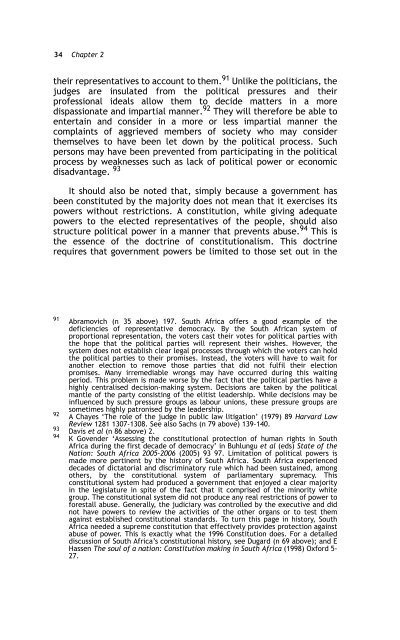LITIGATING SOCIO-ECONOMIC RIGHTS IN SOUTH AFRICA - PULP
LITIGATING SOCIO-ECONOMIC RIGHTS IN SOUTH AFRICA - PULP
LITIGATING SOCIO-ECONOMIC RIGHTS IN SOUTH AFRICA - PULP
Create successful ePaper yourself
Turn your PDF publications into a flip-book with our unique Google optimized e-Paper software.
34 Chapter 2<br />
their representatives to account to them. 91 Unlike the politicians, the<br />
judges are insulated from the political pressures and their<br />
professional ideals allow them to decide matters in a more<br />
dispassionate and impartial manner. 92 They will therefore be able to<br />
entertain and consider in a more or less impartial manner the<br />
complaints of aggrieved members of society who may consider<br />
themselves to have been let down by the political process. Such<br />
persons may have been prevented from participating in the political<br />
process by weaknesses such as lack of political power or economic<br />
disadvantage. 93<br />
It should also be noted that, simply because a government has<br />
been constituted by the majority does not mean that it exercises its<br />
powers without restrictions. A constitution, while giving adequate<br />
powers to the elected representatives of the people, should also<br />
structure political power in a manner that prevents abuse. 94 This is<br />
the essence of the doctrine of constitutionalism. This doctrine<br />
requires that government powers be limited to those set out in the<br />
91 Abramovich (n 35 above) 197. South Africa offers a good example of the<br />
deficiencies of representative democracy. By the South African system of<br />
proportional representation, the voters cast their votes for political parties with<br />
the hope that the political parties will represent their wishes. However, the<br />
system does not establish clear legal processes through which the voters can hold<br />
the political parties to their promises. Instead, the voters will have to wait for<br />
another election to remove those parties that did not fulfil their election<br />
promises. Many irremediable wrongs may have occurred during this waiting<br />
period. This problem is made worse by the fact that the political parties have a<br />
highly centralised decision-making system. Decisions are taken by the political<br />
mantle of the party consisting of the elitist leadership. While decisions may be<br />
influenced by such pressure groups as labour unions, these pressure groups are<br />
sometimes highly patronised by the leadership.<br />
92<br />
A Chayes ‘The role of the judge in public law litigation’ (1979) 89 Harvard Law<br />
Review 1281 1307-1308. See also Sachs (n 79 above) 139-140.<br />
93 Davis et al (n 86 above) 2.<br />
94<br />
K Govender ‘Assessing the constitutional protection of human rights in South<br />
Africa during the first decade of democracy’ in Buhlungu et al (eds) State of the<br />
Nation: South Africa 2005-2006 (2005) 93 97. Limitation of political powers is<br />
made more pertinent by the history of South Africa. South Africa experienced<br />
decades of dictatorial and discriminatory rule which had been sustained, among<br />
others, by the constitutional system of parliamentary supremacy. This<br />
constitutional system had produced a government that enjoyed a clear majority<br />
in the legislature in spite of the fact that it comprised of the minority white<br />
group. The constitutional system did not produce any real restrictions of power to<br />
forestall abuse. Generally, the judiciary was controlled by the executive and did<br />
not have powers to review the activities of the other organs or to test them<br />
against established constitutional standards. To turn this page in history, South<br />
Africa needed a supreme constitution that effectively provides protection against<br />
abuse of power. This is exactly what the 1996 Constitution does. For a detailed<br />
discussion of South Africa’s constitutional history, see Dugard (n 69 above); and E<br />
Hassen The soul of a nation: Constitution making in South Africa (1998) Oxford 5-<br />
27.
















